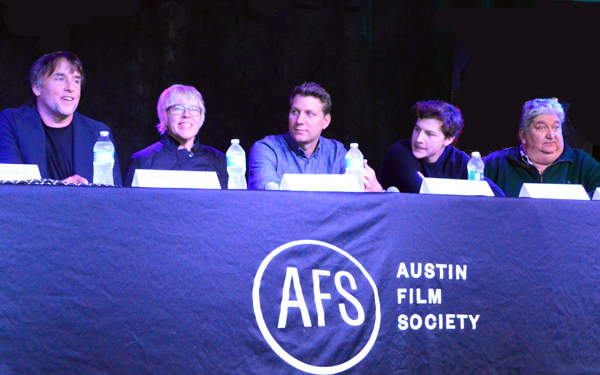It is a golden age not only for television but also for independent films. At least, it is according to the Austin Film Society’s founder and artistic director Richard Linklater, speaking at the press conference for the 2017 Texas Film Awards.
At the panel of this year’s Hall of Fame Honorees, Richard Linklater, together with Honorees Hector Galan (Children of Giant), Tye Sheridan (X-Men: Apocalypse), Jeff Nichols (Loving), and producer Sarah Green (Midnight Special), discussed a wide range of issues related to filmmaking and screenwriting.
Creative Screenwriting was fortunate enough to attend.
Sarah Green kicked off the panel with a discussion about her work on Song to Song with Terrence Malick.

Sarah Green
Green: It’s about sex and drugs and rock and roll. There’s this just unbelievable young kid named Ryan Gosling, you’ll like him. Rooney Mara – she’s incredible. Michael Fassbender, Natalie Portman, Cate Blanchett, Patti Smith, Iggy Pop – there’s so many – Bérénice Marlohe, Val Kilmer…It kind of just goes on and on. The Black Lips, the Red Hot Chili Peppers – some of these are performing and some are interacting with other actors.
Jeff Nichols then talked about his Oscar-nominated film Loving.

Jeff Nichols
Nichols: It wasn’t until I got behind the curtain with Loving, that I realized just how far away all my other films were from ever being considered in that world.
And that was illuminating for a lot of reasons.

Jeff Nichols with Joel Edgerton on set of Loving. Credit : Ben Rothstein / Focus Features
And Tye Sheridan talked about his new movie, Ready Player One, directed by Steven Spielberg and due to be released in 2018.

Tye Sheridan
Sheridan: The film is based on a sci-fi novel written by Ernest Cline. It takes place in the future. And when I read it I just thought “wow, it’s such an honest depiction of where we’re headed in our world right now. It’s the technology and the kids playing video games – that social world.”
If you work in film, it’s everyone’s dream-come-true to work with Steven Spielberg. I was working with the best of the best.
Talking next about funding, Green said that more companies such as Amazon, HBO, and Netflix are providing funding for movies.
Green: More is better when it comes to financing opportunities. We want every opportunity we can get, and then it’s a question of “what’s the best distribution company for that particular movie, that will get it seen more on television, that will get it seen more in the theaters?” I love that there are more opportunities.
However, panel moderator Steven Gaydos said that a gulf still exists in Hollywood between large budget studios, and mid-level independent or specialty film companies.

Richard Linklater
Linklater: It’s excruciating to talk about, but I think it’s kind of true. But with that said, we’re sitting here with a guy who got that rare film made – and I’m talking about Jeff Nichols – Midnight Special.
Nichols: I feel like I live in a bit of bubble though, because I’m a rare exception in the year 2016 to get a film like Midnight Special released. So I know my experience is unique. It took somebody at the top to reach down literally and give me that opportunity.
That’s what’s so great about Rick’s [Richard Linklater’s] career. I use it as a model because he’s been able to move back and forth between those worlds. He seems to be having fun in all of them.

Jaeden Liberher as Alton in Midnight Special – © 2016 Warner Bros. Entertainment Inc. All rights reserved
Linklater: I think you have to be really practical in your approach. You know, it’s storytelling. You ask “what does this story need?” Well if it’s a period film it needs a bigger budget, so I’ll try to take this one to the studio. Or if this one’s a really intimate little story, let’s just keep that at home.
I think a filmmaker gets into trouble when they take that personal indie film and get a huge budget – that’s where careers go off the rails. So, you have to just be humble and try to not to spend any more than you have to.
It’s the golden age of television, but if you really think about it, it’s also the golden age of documentaries, you know? I think that’s clear. And if you really think about it, it’s the golden age of indie cinema.
Take the Oscars and the recent recognition for a film like Moonlight. If it had come out in 1985, back then indie films didn’t hit the mainstream awards shows. A couple did: there were nominations for John Pierson [who produced some of Linklater’s first films, along with those created by Spike Lee, Michael Moore and Kevin Smith]. But it was weird for an indie film to break through at that time or to receive recognition.
Green: It also matters how much they’re spinning it, how they’re releasing it. It’s not just about the most money, but it’s about the money that’s spent, and how much they can put behind it, and whether they actually know how to release a film of a certain type.

Mahershala Ali as Juan and Alex R. Hibbert as Little in Moonlight. Photo by David Bornfriend
Galan said Latinos have become one of the most under-represented ethnicities in American cinema today.

Hector Galan
Galan: There are more Latinos in America than there are Canadians in Canada. But you just don’t see that represented on the big screen, even on the small screen, to the degree that reflects the population.
It’s true that a lot of people look at us in LA as gardeners, maids and people who take care of babies. It’s real complex because we do have Spanish-language networks. So, some of us speak Spanish and some of us don’t. It’s very very complex.
When there are a 25 million eligible Latino voters in a 54 million population, with 18,000 Latinos turning 18 every month in this country, there’s still a lot of representation that needs to happen.
A member of the audience asked Linklater if he knew what might happen to The Texas Moving Image Industry Incentive Program, that has provided incentives for filmmakers to make their movies in Texas since 2005, but is now at risk.
Linklater: I just shot a film [Last Flag Flying] in Pittsburgh. So it’s a real issue, but I think there’s some hope to getting us back to where we were.
And we’re a good industry. We moviemakers bring hundreds of millions of dollars in to Texas, we bring in the jobs, clean industry and that’s just the business.
But I worry more about the cultural representation. If you tell Texas stories you’ve got to tell them in Texas. It’s kind of sad; last year, Hell or High Water, a story set in West Texas, was shot, as the producers for the movie have said, “as close to Texas as we could.” They shot it in New Mexico.
We would feel a lot differently about The Last Picture Show, if they had shot that in Colorado. So culturally, for our own stories, our own borders are important.

Jeff Bridges as Duane Jackson, Cybill Shepherd as Jacy Farrow and Timothy Bottoms as Sonny Crawford in The Last Picture Show © 1971 – Columbia Pictures
When a member of the audience asked what the future holds for documentarians, Galan responded with an impassioned plea to filmmakers to tell the stories of undocumented immigrants in Texas affected by raids conducted by Immigration and Customs Enforcement.
Galan: Now is really an important time for documentary work. At one time, people were predicting the death of the documentary. I think today it’s more important than ever, especially for us Latinos.
I have so many friends out there right now who are hiding, people that I know. It’s like when I was in Germany – and I’m kind of telling you some history – but I would go to Munich or Heidelberg or some of those places in Germany that were still standing after the bombings in World War II. I imagined what it must have been like for those people hiding and knowing that the Nazis were coming for them. That’s happening now. A lot of people don’t know.
People are afraid to go out of their homes. People need to report on this and the division that is happening.
Finally, this reporter for Creative Screenwriting magazine asked Green what the future holds for women screenwriters and filmmakers.
Green: It’s our responsibility as producers, and the studios’ responsibilities as financers, and everyone’s responsibility, to ensure that all voices are heard.
Whether it’s people of color, whether it’s different genders, whatever those stories we need to be telling are, we need to make sure that we are training those people, that we are providing those opportunities.
By Donna Marie Miller.
 The Texas Film Awards Hall of Fame panel was hosted at Gibson’s Guitar Showroom.
The Texas Film Awards Hall of Fame panel was hosted at Gibson’s Guitar Showroom.
For more information about the Austin Film Society and Texas film Awards, visit their website:
www.austinfilm.org/Texas-Film-Awards
Featured image and headshots: Texas Film Awards 2017 Press Conference © Donna Marie Miller
[addtoany]
Before You Go
Don’t miss our other great interviews with the panelists:




